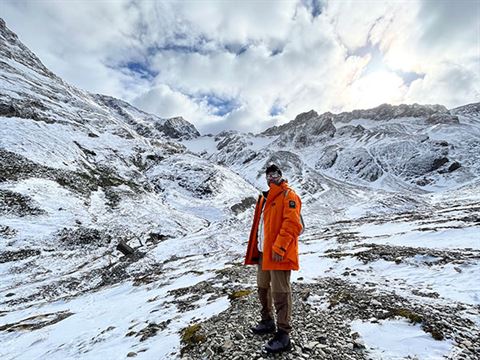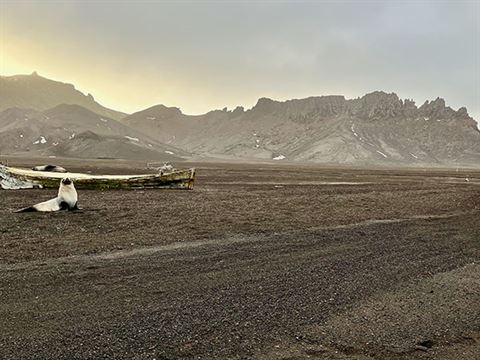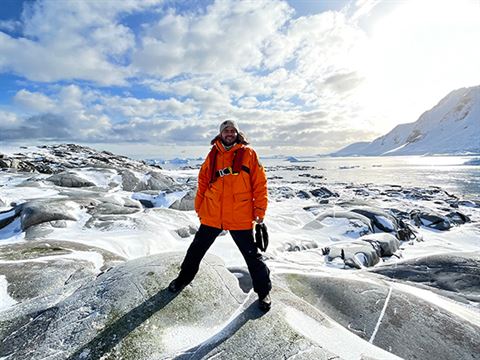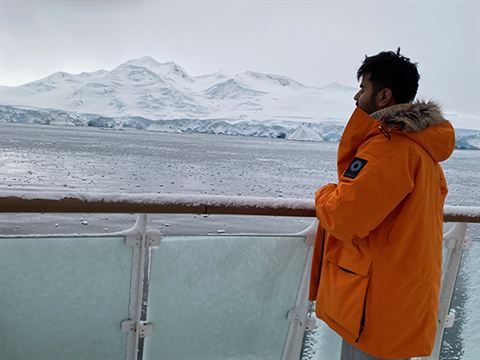MADE BY MEMBERS • June 2022
My Club: the Antarctic explorers
What’s it like to experience one of the most remote places in the world? Poppy Cross and Agam Dhingra – who took part in this year’s 2041 expedition to Antarctica, supported by British Airways – can answer that very question.
The young climate leaders and Executive Club Members joined 168 participants from 38 countries to better understand how nations and businesses of all backgrounds can work together to protect our planet and push toward a more sustainable future and BA Better World...
What drove you to join the two-week expedition?
Poppy: I’m going to medical school next year, and I’m hoping to become a doctor. During the expedition, the lectures touched on the global health impact of climate change. The emergence of new diseases, famine and climate refugees is going to affect a lot of people. Antarctica is so important. If the world recognises it as a place that needs protection, we might get our butts in gear before any of these impacts happen.
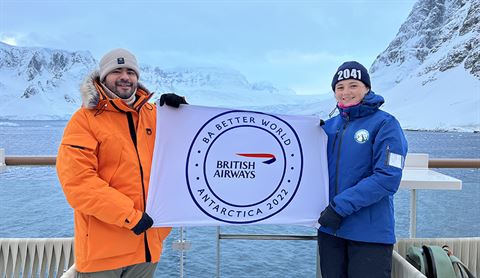
Young adventurers Agam Dhingra and Poppy Cross
Agam: I want to work in the environmental, social and governance space. The expedition helped me to understand how businesses and communities can find a common ground when it comes to climate change. I also looked at the importance of India, my home country, which is one of the largest emitters in the world, and how we can play a more active part.
How will you use your learnings?
Poppy: I plan to share why Antarctica needs to be saved with schools, businesses and groups, and how they can help. I also want to organise clean-ups near my area.
Agam: I'm going to amplify the message to as many people as possible. I'm also planning on creating an app where customers can transfer a small amount of money to carbon offsetting projects.
Where did you travel from?
Poppy: I travelled through Brazil into Argentina, and met up with the expedition team in Ushuaia, where the expedition started.
Agam: I flew from New Delhi to London to Buenos Aires to Ushuaia.
Where did you go from there?
Agam: We sailed on Ocean Victory. We travelled through the Drake Passage, one of the most turbulent and unpredictable waters in the world. We weren’t allowed on deck during the 30 hours it takes to pass – there were waves as high as 20 metres. On arrival, we were greeted with one of the most majestic sunsets that even the captain had ever seen. We didn’t go deep into the South Pole (that’s for scientific exploration). We went to the peninsula – the only area accessible for expeditions.
How would you describe Antarctica?
Poppy: Otherworldly, awe-inspiring, vast, dangerous… indescribable. We were surrounded by millions of pieces of ice – so isolated, yet teeming with life.
Agam: The backdrop of white is like stepping into Narnia. You see so much wildlife, from humpback whales to seals and gentoo penguins. It’s such a massive landscape that you feel so small. Honestly, I’m still at a loss for words.
Most memorable moments?
Poppy: Listening to the silence, interrupted by the squawk of a penguin, or the magical sound of pieces of ice hitting each other in the water.
Agam: Seeing penguins for the first time – my excitement had no bounds. We also did a polar plunge, where we swam into the ocean.
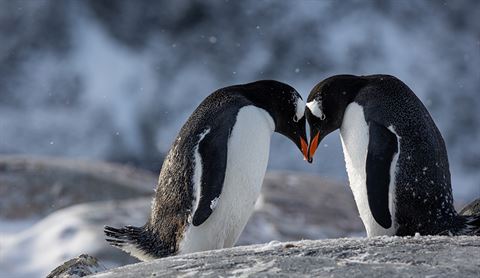
Penguins on Pléneau Island (credit: Trenton Branson)
Who were you with and what did you talk about?
Agam: A large range of people, from someone working at the grassroots level to help communities affected by climate change in Brazil to the chief climate advisor at Shell. We talked about the Paris Climate Agreement, the COP26 summit and the IPCC report that’s recently come out on climate change. It says that we can limit the increase in global temperature to 1.5°C, but only if we act now.
How did the expedition align with our sustainability programme, BA Better World?
Poppy: It definitely aligned with the leadership and collaboration aspect of bringing people together from across the world.
Agam: A big topic of conversation was SAF (sustainable aviation fuel), and how it’s great that airlines have become more active in minimising their carbon impact. It’s not a one-day solution. You need to connect people, especially in this globalised setting, otherwise, how do you expect more change? The most prominent airlines, including British Airways, are making a lot of effort in terms of sustainability.
What inspired you to go?
Poppy: My grandad has been the safety officer of the expedition for 20 years. When I was about nine, I met the polar explorer and expedition leader Robert Swan at his house for dinner. I said, “Rob, I’m gonna come with you to Antarctica!”
Agam: In 2009, I was selected for a national three-day climate change workshop in India. There I met a participant who’d been to Antarctica and kept in touch. I’ve always wanted to go to witness the impact of climate change.
How did British Airways help make the expedition possible?
Poppy: My dad is a Senior First Officer on the 777s, so I used his staff flights to get to Rio. The company also donated to the foundation, the Explorers Passage, on my behalf.
Agam: It provided travel support for the expedition and my flights. The airline was so helpful, allowing me time to take it all in, learn and then let it know how everything is going.
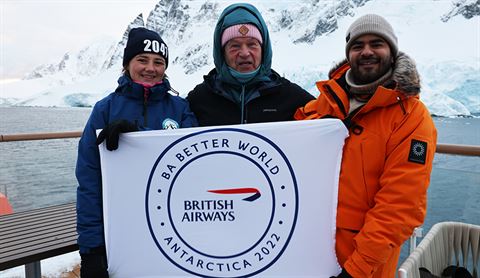
Poppy and Agam with expedition leader Robert Swan
What environmental impact did you witness?
Poppy: The hottest temperature – possibly ever – was recorded. It got up to -11°C, and the average temperature is -55°C. One of the doctors went for a jog! At the start of the expedition, Rob said, “You guys might feel eco-anxiety while you’re here, and that’s OK.”
Agam: An ice shelf the size of Rome broke off on the east coast, which is relatively stable in terms of ice levels. On another day, it rained – and that never happens there!
How does this affect places far away?
Poppy: Antarctica is directly linked to ecosystem structures, species range shifts, water scarcity, food production, as well as having an impact on health, wellbeing, cities and settlements. Its sea levels have started to rise due to increases in temperature. The current rate is 3.4 million litres per year, which, in a decade, could swamp low-lying islands, where people live.
What are some ways British Airways is making aviation more sustainable?
Poppy: All domestic flights in the UK are offset anyways, and you as a passenger can opt in to offset international flights, which I did. There’s also investment in sustainable aviation fuel, hydrogen-propulsions and electric technologies, as well as supporting natural climate solutions.
How can our passengers fly more sustainably?
Poppy: You can take steps to offset your flights or even buy SAF through BA Better World: I paid to offset my flights to South America. Pack light, too. The more weight a plane carries, the more fuel it burns through.
Agam: If you can, take public transport to the airport, and bring a reusable water bottle or use the same glass for drinks on the plane.
Any advice for other young climate leaders?
Agam: Don’t be afraid of whatever you have in mind, especially now. A lot of times, younger people tend to be influenced by older generations. What’s more important is how the internet has made awareness on climate change much more widespread. We’re at an interesting inflection point in society, where younger people are pointing out what didn't work in the past. This is how we need to lead in the future. Younger folk are on the right trajectory – they just need to have conviction in themselves. The important thing is for everybody from different parts of the world to come together and lead the change.
Through our sustainability programme, BA Better World, we're committed to creating a better future. We’re driving urgent action towards net zero carbon emissions by 2050, delivering life-changing opportunities in the communities we serve and building a workplace that’s diverse and inclusive. To find out more, click here.
2041 is a 50-year mission to inspire actions towards the preservation of Antarctica for science and peace. Founded by polar explorer and environmental leader Robert Swan, OBE, there are just 19 years left.
More from previous issues

Why the Executive Club is great for family travel
Five ways Executive Club membership can benefit not only you, but the whole clan, taking you to the skies – and on unforgettable escapes – faster
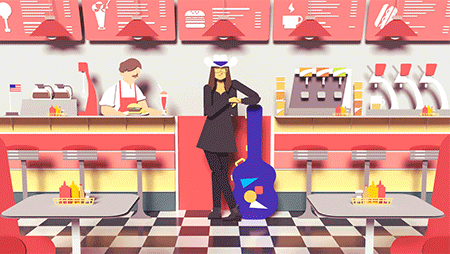
A Member’s guide to Nashville
As ever, Music City is in tune with the times. With direct flights resuming here on 9 May, it’s proud to present a raft of new hotels, eateries and other attractions
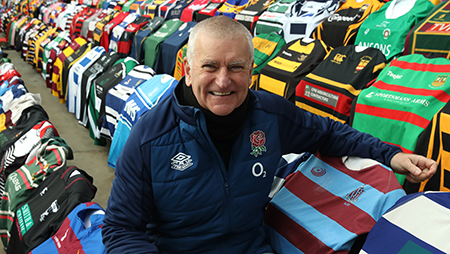
Going for Gold: Bill Sweeney, England Rugby
The England Rugby CEO talks about his extraordinary career flying with BA, from in-flight experiences to his favourite British traits
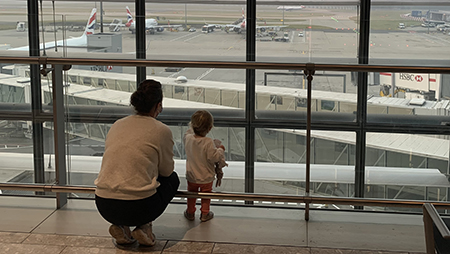
The family that flies together
Husband and wife pilots Mark Mannering-Smith and Lyndsay McGregor on how they deal with work chat at home and travelling with their AV-enthusiast daughter
